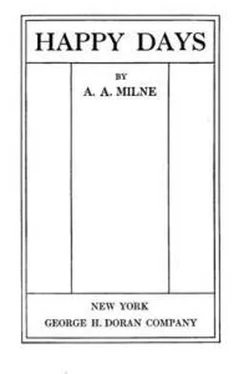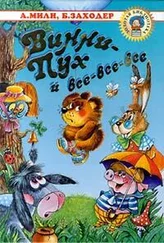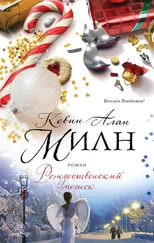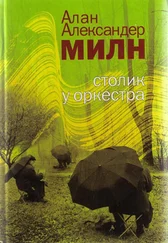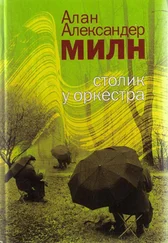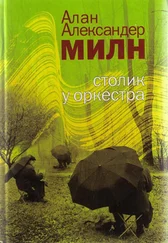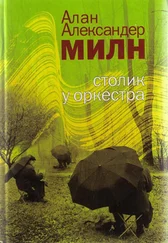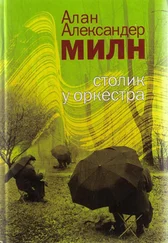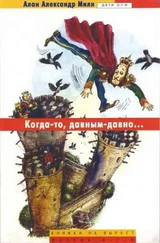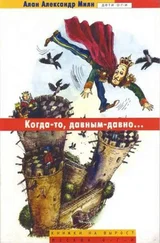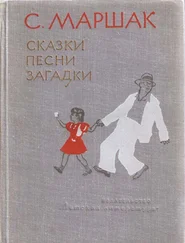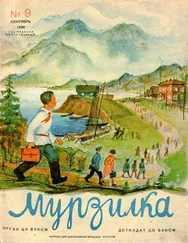Алан Милн - Happy Days
Здесь есть возможность читать онлайн «Алан Милн - Happy Days» весь текст электронной книги совершенно бесплатно (целиком полную версию без сокращений). В некоторых случаях можно слушать аудио, скачать через торрент в формате fb2 и присутствует краткое содержание. Год выпуска: 2014, Издательство: epubBooks Classics, Жанр: Юмористическая проза, на английском языке. Описание произведения, (предисловие) а так же отзывы посетителей доступны на портале библиотеки ЛибКат.
- Название:Happy Days
- Автор:
- Издательство:epubBooks Classics
- Жанр:
- Год:2014
- ISBN:нет данных
- Рейтинг книги:5 / 5. Голосов: 1
-
Избранное:Добавить в избранное
- Отзывы:
-
Ваша оценка:
- 100
- 1
- 2
- 3
- 4
- 5
Happy Days: краткое содержание, описание и аннотация
Предлагаем к чтению аннотацию, описание, краткое содержание или предисловие (зависит от того, что написал сам автор книги «Happy Days»). Если вы не нашли необходимую информацию о книге — напишите в комментариях, мы постараемся отыскать её.
Happy Days — читать онлайн бесплатно полную книгу (весь текст) целиком
Ниже представлен текст книги, разбитый по страницам. Система сохранения места последней прочитанной страницы, позволяет с удобством читать онлайн бесплатно книгу «Happy Days», без необходимости каждый раз заново искать на чём Вы остановились. Поставьте закладку, и сможете в любой момент перейти на страницу, на которой закончили чтение.
Интервал:
Закладка:
XXXIX
Bachelor Relics
"Do you happen to want," I said to Henry, "an opera hat that doesn't op? At least it only works one side."
"No," said Henry.
"To any one who buys my opera hat for a large sum I am giving away four square yards of linoleum, a revolving bookcase, two curtain rods, a pair of spring–grip dumb–bells and an extremely patent mouse–trap."
"No," said Henry again.
"The mouse–trap," I pleaded, "is unused. That is to say, no mouse has used it yet. My mouse–trap has never been blooded."
"I don't want it myself," said Henry, "but I know a man who does."
"Henry, you know everybody. For Heaven's sake introduce me to your friend. Why does he particularly want a mouse–trap?"
"He doesn't. He wants anything that's old. Old clothes, old carpets, anything that's old he'll buy."
He seemed to be exactly the man I wanted.
"Introduce me to your fellow clubman," I said firmly.
That evening I wrote to Henry's friend, Mr. Bennett. "Dear Sir," I wrote, "if you would call upon me to–morrow I should like to show you some really old things, all genuine antiques. In particular I would call your attention to an old opera hat of exquisite workmanship, and a mouse–trap of chaste and handsome design. I have also a few yards of Queen Anne linoleum of a circular pattern which I think will please you. My James the First spring–grip dumb–bells and Louis Quatorze curtain–rods are well known to connoisseurs. A genuine old cork bedroom suite, comprising one bath–mat, will also be included in the sale. Yours faithfully."
On second thoughts I tore the letter up and sent Mr. Bennett a postcard asking him to favour the undersigned with a call at 10.30 prompt. And at 10.30 prompt he came.
I had expected to see a bearded patriarch with a hooked nose and three hats on his head, but Mr. Bennett turned out to be a very spruce gentleman, wearing (I was sorry to see) much better clothes than the opera hat I proposed to sell him. He became businesslike at once.
"Just tell me what you want to sell," he said, whipping out a pocket–book, "and I'll make a note of it. I take anything."
I looked round my spacious apartment and wondered what to begin with.
"The revolving bookcase," I announced.
"I'm afraid there's very little sale for revolving bookcases now," he said, as he made a note of it.
"As a matter of fact," I pointed out, "this one doesn't revolve. It got stuck some years ago."
He didn't seem to think that this would increase the rush, but he made a note of it.
"Then the writing–desk."
"The what?"
"The Georgian bureau. A copy of an old twentieth–century escritoire."
"Walnut?" he said, tapping it.
"Possibly. The value of this Georgian writing–desk, however, lies not in the wood but in the literary associations."
"Ah! My customers don't bother much about that, but still—whose was it?"
"Mine!" I said with dignity, placing my hand in the breast pocket of my coat. "I have written many charming things at that desk. My 'Ode to a Bell–push,' my 'Thoughts on Asia,' my―"
"Anything else in this room?" said Mr. Bennett. "Carpets, curtains―"
"Nothing else," I said coldly.
We went into the bedroom and, gazing on the linoleum, my enthusiasm returned to me.
"The linoleum," I said, with a wave of the hand.
"Very much worn," said Mr. Bennett.
I called his attention to the piece under the bed.
"Not under there," I said. "I never walk on that piece. It's as good as new."
He made a note. "What else?" he said.
I showed him round the collection. He saw the Louis Quatorze curtain–rods, the cork bedroom suite, the Cæsarian nail–brush (quite bald), the antique shaving–mirror with genuine crack—he saw it all. And then we went back into the other rooms and found some more things for him.
"Yes," he said, consulting his notebook. "And now how would you like me to buy these?"
"At a large price," I said. "If you have brought your cheque–book I'll lend you a pen."
"You want me to make you an offer? Otherwise I should sell them by auction for you, deducting ten per cent. commission."
"Not by auction," I said impulsively. "I couldn't bear to know how much or rather how little, my Georgian bureau fetched. It was there, as I think I told you, that I wrote my 'Guide to the Round Pond.' Give me an inclusive price for the lot, and never, never let me know the details."
He named an inclusive price. It was something under a hundred–and–fifty pounds. I shouldn't have minded that if it had only been a little over ten pounds. But it wasn't.
"Right," I agreed. "And, oh, I was nearly forgetting. There's an old opera hat of exquisite workmanship, which―"
"Ah, now clothes had much better be sold by auction. Make a pile of all you don't want and I'll send round a sack for them: I have an auction sale every Wednesday."
"Very well. Send round to–morrow. And you might—er—also send round a—er—cheque for—quite so. Well, then good morning."
When he had gone I went into my bedroom and made a pile of my opera–hat. It didn't look very impressive—hardly worth having a sack specially sent round for it. To keep it company I collected an assortment of clothes. It pained me to break up my wardrobe in this way, but I wanted the bidding for my opera–hat to be brisk, and a few preliminary suits would warm the public up. Altogether it was a goodly pile when it was done. The opera–hat perched on the top, half of it only at work.
To–day I received from Mr. Bennett a cheque, a catalogue and an account. The catalogue was marked "Lots 172–179." Somehow I felt that my opera hat would be Lot 176. I turned to it in the account.
" Lot 176—Six shillings "
"It did well," I said. "Perhaps in my heart of hearts I hoped for seven and sixpence, but six shillings—yes, it was a good hat."
And then I turned to the catalogue.
" Lot 176 —Frock coat and vest, dress coat and vest, ditto, pair of trousers and opera hat."
" And opera hat. " Well, well. At least it had the position of honour at the end. My opera hat was starred.
Part VI
Little Plays for Amateurs
Note.— There are only six plots allowed to us who are not professionals. Here they are. When you have read them, then you will know all about amateur theatricals.
XL
"Fair Mistress Dorothy"
The scene is an apartment in the mansion of Sir Thomas Farthingale. There is no need to describe the furniture in it, as rehearsals will gradually show what is wanted. A picture or two of previous Sir Thomas's might be seen on the walls, if you have an artistic friend who could arrange this; but it is a mistake to hang up your own ancestors, as some of your guests may recognise them, and thus pierce beneath the vraisemblance of the scene.
The period is that of Cromwell—sixteen something.
The costumes are, as far as possible, of the same period.
Mistress Dorothy Farthingale is seated in the middle of the stage, reading a letter and occasionally sighing .
Enter My Lord Carey.
~Carey.~ Mistress Dorothy alone! Truly Fortune smiles upon me.
~Dorothy~ ( hiding the letter quickly ). An she smiles, my lord, I needs must frown.
~Carey~ ( used to this sort of thing and no longer put off by it ). Nay, give me but one smile, sweet mistress. ( She sighs heavily. ) You sigh! Is't for me?
~Dorothy~ ( feeling that the sooner he and the audience understand the situation the better ). I sigh for another, my lord, who is absent.
~Carey~ ( annoyed ). Zounds, and zounds again! A pest upon the fellow! ( He strides up and down the room, keeping out of the way of his sword as much as possible. ) Would that I might pink the pesky knave!
Читать дальшеИнтервал:
Закладка:
Похожие книги на «Happy Days»
Представляем Вашему вниманию похожие книги на «Happy Days» списком для выбора. Мы отобрали схожую по названию и смыслу литературу в надежде предоставить читателям больше вариантов отыскать новые, интересные, ещё непрочитанные произведения.
Обсуждение, отзывы о книге «Happy Days» и просто собственные мнения читателей. Оставьте ваши комментарии, напишите, что Вы думаете о произведении, его смысле или главных героях. Укажите что конкретно понравилось, а что нет, и почему Вы так считаете.
